hoarded coffer
"treasure hoard"
hoarded coffer
"treasure hoard"
bewail my cares
"sing my lament"
kinsmen
Old English does not record quotation marks so there is no clear indication of where one speech ends and another begins in this poem (so this stanza may be spoken by the same speaker that goes on to relate, in first person, his story in the following stanza or may be a second "narrator" commenting on the general state of the Wanderer)
earth-stepper
i.e. The Wanderer
the way of the world is ever an open book.”
Better translation: "Wyrd fully fixed" (Wyrd being the Old English for Fate; a powerful but not quite personified force. Its meanings range from prescribed "destiney" to personified "fate" to "what happens" (usually in a negative sense).
rime-chilled
"frost-cold"
mind-caring
i.e. "troubled in mind"
Measurer’s
This was an Old English term for "God" (note that Caedmon also uses this in his Hymn); a better translation would be "Maker's"
himself was mortally wounded
You can read the varying accounts of this in more detail in the chapter "The Myth of Arthur's Return".
Walter, archdeacon of Oxford,
"Walter of Oxford" (d. 1151) was a friend of Geoffrey's and is here cited as the chief source for the information found in this "History". In the dedication to this work, Geoffrey claims he could find very little material on the early Kings of the Britons and was given a "very ancient book" by Walter which, Geoffrey claims, he has translated into Latin here. Few modern scholars believe this.
Guanhumara
i.e. Guinevere.
till his last engagement.
Ominous foreshadowing...
a giant of monstrous size
Generally remembered as the "Giant of Mont-Saint-Michel".
Hoel
This character appears in Welsh mythology as "King of Brittany" and is instrumental in helping Arthur conquer "Gaul" (i.e. northern France)
bear
Interesting fact: the name "Arthur" likely has its roots in the Celtic word for "bear".
sewer
I.e., "the person who sews" (not...urhm, the other thing...)
Modred
Or, Mordred. He is a key player in Arthur's downfall (often delivering the blow that ultimately kills him) - he he is also recorded as the half-brother of Gawain in some accounts.
weetness of temper and innate goodness
You can see a very different portrayal of a young Arthur (a rather arrogant and reckless one) in Sir Gawain and the Green Knight.
set the crown upon Arthur’s head
The coronation of Arthur was, as you might imagine, a popular theme for British artists, such as C.E. Butler here:

Tintagel,
This is a very important location in Arthurian legend; the castle is the site of many of the tales of the Knights of the Roundtable. It's also, as you can imagine, quite the tourist trap.
Igerna
Also called Igraine, or Ygraine (in French) - she will be Arthur's mother though she already has children with Gorlois (Elaine, Morgause and Morgan le Fey who also feature prominently in Arthurian legend).
Pendragon
Note that the name "Pen Dragon" is from the middle Welsh Pen Draig and means "Chief Dragon".
Merlin
Yes, that Merlin.
Rowen
Or, Rowena. She is a classic femme fatale who was likely entirely fictitious (here she is with Vortigern in a painting by William Hamilton):

Thong Castle.
There is dispute as to whether this castle existed and, if so, where it might have been located - though this town seems to have the best claim.
Lindesia
Modern-day Lincolnshire:
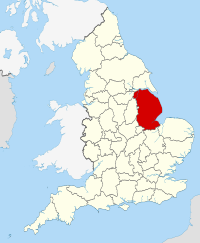
Vortigern
He may or may not have existed (scholars are still unsure) - legend has it (as you will see below) that he invited the famous Hengst and Horsa to aid in helping him fight off the Picts and Scots (they revolted, however, killing his son and forming the kingdom of Kent in the process). Remember that this is the same Vortigern that Gildas condemned for "losing" Britain.
Guithelin
The only account we have of this king is here. Remember that Geoffrey is creating a fictional history and it is important to establish a direct line from Roman Emperor to King Arthur.
Aurelius Ambrosius,
Note that Geoffrey of Monmouth is referencing this character from Gildas' account.
promoted Constantine to the throne
Constantine is crowned at York in 306 AD. He will go on to engage in a series of civil wars to wrest power from two other emperors and become sole ruler of both east and west by 324. He will become most famous, however, as the first Roman emperor to convert to Christianity and he was very active in promoting the Church (medieval historians remembered him as a paragon of virtue - though modern scholarship disputes this).
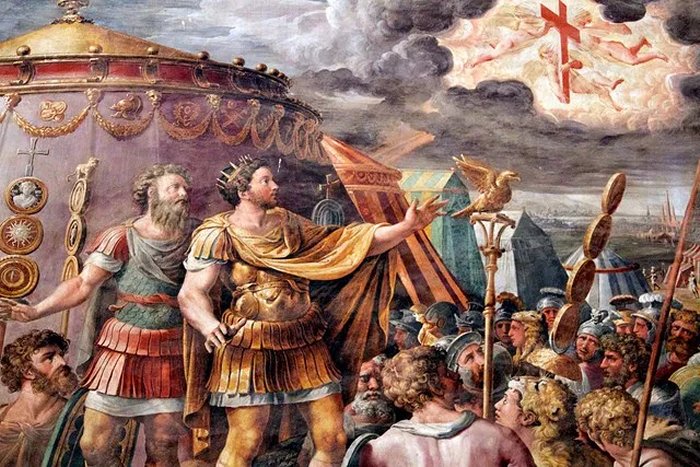
Totness;
A market town at the head of the estuary of the River Dart in Devon - by the time Monmouth is writing, it is an important center of commerce for the area. 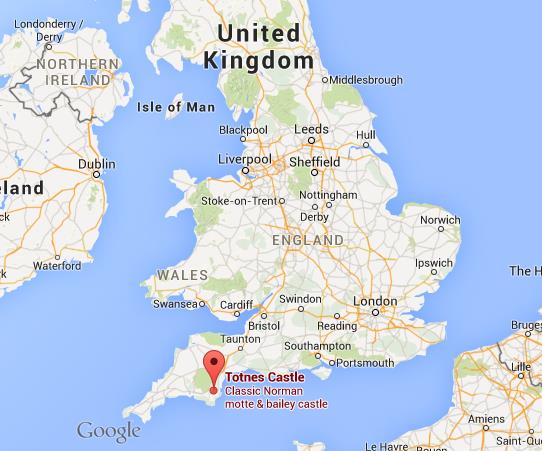
Guanius and Melga
Guanius was king of the Huns and Melga kings of the Picts; they ravaged the German lands and British Isles, killing anyone who was seen to be an ally of Maximian - this included leaders as well as the general population.
As then you are men, behave yourselves like men: call upon the name of Christ, that he may inspire you with courage to defend your liberties.”

tears and vows of perpetual subjection
Remember Gildas' "Groans of the Britons"...
Janus.
Note how different this ending is to Shakespeare's wherein Cordelia is eventually hanged (quite complicated plot twists lead to this) and her father left weeping over her body. 
buried her father in a certain vault,
Said to be along the site of the "Jewry Wall" - a 2nd century Roman ruin. 
Karitia
Or, Calais (France)- a major trading port with the English - in fact, during medieval times, it was brought under English control in 1337 and held for more than 200 years. In WWII, it was razed beyond recognition as Germans sought to use it to attack Britain with missles launched across the Channel. 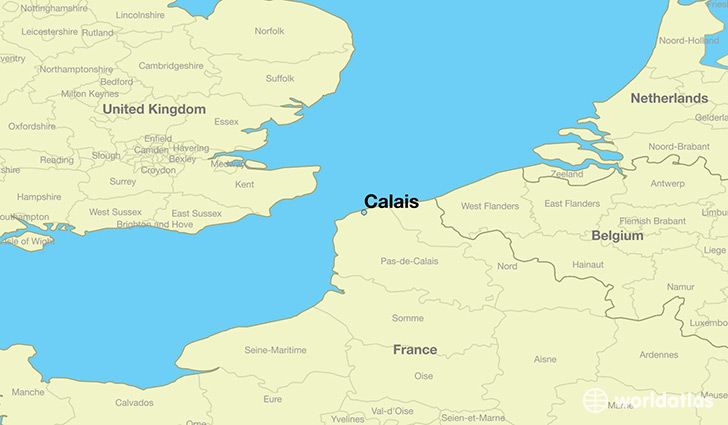
since the punishment of lost happiness is greater than the sense of present misery?

upbraid
"find fault with (someone); scold."
credulous
"having or showing too great a readiness to believe things."
he had thoughts of dividing his kingdom among them
This forms the basis for Shakespeare's plot; here's a trailer for the most recent adaptation:
Leircestre.
Or modern "Leicester" a city in the East Midlands - though the first part of the name "Lei" is likely related to the Bretonic Ligora or Legora, which is a river name and not at all related to "Leir" as presented here.
At this time Eli the priest
Note that Geoffrey of Monmouth is trying to tie British history to a Biblical timeline (though, as here, this "historical dating" is quite suspect)
Goëmagot
Also known as "Gogmagog)". As you read further, what are some similarities between this giant and Grendel from Beowulf?
giants.
This is one of the enduring myths around the Britons - that they were taller than other peoples and that prehistoric Britain was a land of "giants".
Brutus.
Geoffrey will record that he is the first king of Britain.
till divine vengeance
What is this referring to?
the best of islands
Sound familiar? Compare to the opening lines of Gilas' Ruin of Britain.
the groans of the Britons.
This, the final appeal for help from the Roman military become the famous "last words" of the Britons.
o cover with decent clothing those parts of their body which required it

Arian
Arianism, based on the teachings of Arius (c. 250-333), was a sect of Christianity that denied Christ's divinity; at the Council of Nicaea (325 CE), Arian beliefs were deemed heretical.
it has always been a custom with our nation, it is at present, to be impotent in repelling foreign foes,
Gildas certainly doesn't mince words.
yeasty wave rising to the stars
Definitely a strong line. I invite anyone to begin a poem: "Yeasty Wave Rising to the Stars...."
Maximus
Magnus Maximus was a Roman Emperor and general commander of Britain in the 380s.
wonderful miracles in presence of the impious blasphemers
A series of miracles occured as Alban was on his way to be executed; eventually he was beheaded atop a hill of wildflowers after which the executor's eyes popped out so that he could not "enjoy" the fruits of his labor. The church of St. Alban's his said to be built at the spot where the head eventually came to a rolling stop:
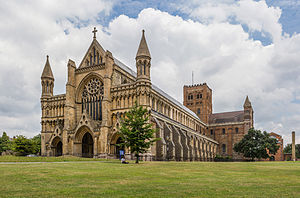
P.S. Details of his execution can be found in Bede's account and you can read about them here.
St. Alban
St. Alban is still venerated today as the first British Christian martyrs (sometimes called the "protomartyr").

Diocletian
A Roman Emperor from 284 to 305.
Porphyry
A neoplatonic philosopher) who was best known for his Introduction to logic that was a standard textbook on the subject well into the middle ages.
stiff-necked and stubborn-minded
This is some great personification that likely reveals Gildas' perception of Britons generally.
Thames and the Severn, as it were two arms
Lovely imagery - here is a map of major rivers:

the general destruction of every thing that is good
Okay, then. Gildas--as you will soon see--is settling some scores here. While it may have quite a few historical inaccuracies, it is the earliest record we have of contemporary history from 6th century Britain. Parts of this text will be familiar as Bede and Geoffrey of Monmouth borrowed heavily from it.
Caedmon’s Hymn
This is the oldest poem in Old English and one of the earliest examples of alliterative, Germanic verse.
so ended his life in silence
This is quite the poetic ending for a man so renowned for his music and lyrics.
Viaticum
"the Eucharist as given to a person near or in danger of death."
turned it into most harmonious verse

Awaking from his sleep
The religious vision-dream will appear again in later texts (notably, the writings of Julian of Norwich, Margery Kempe, and William Langland).
he was wont to make songs of piety and religion
And so enters CAEDMON...he is the first author (in English) who we know by name (his famous "Hymn" can be read below).
These monasteries
The fate of Whitby Abbey was unknown until 867 when it was destroyed by the Danes; it was rebuilt after the Norman Conquest and again sacked with the dissolution of the monasteries under Henry VIII; this is what remains (it is said that St. Hilda haunts the environs still). 
This dream was doubtless fulfilled in her daughter that we speak of
Remember the characteristics of a hero - a sign of future greatness/glory (usually a mother's dream while pregnant) is often one of the hallmarks.
none had any private property.
Her monastery was in the "Celtic Style" wherein all property was communal.
Cale
This refers to Portus Cale in northern Portugal.
Hilda,681 abbess of the monastery
Hilda, Abbess of Whitby, was king Edwin's niece and a member of his court. She was baptised into Christianity at the age of 13 with the entire court (on the Easter Day described above). She is remembered in the account below as a skilled teacher, administrator and exemplar of monastic values of charity, piety and peace. 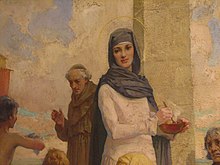
Uuffings.
I don't know why but "Uffings" seem like they would be "ignoble", right?
cruel death
Edwin was killed at the Battle of Hatfield Chase (as was his son).
a large number of the common sort,
Bede seems more interested in the conversion of nobles and priests than in the common people generally so this is an interesting detail.
destroyed the altars
Though it is not specifically stated here, this was thought to be a shrine to the god Odin (or Woden as it is recorded here).
Godmunddingaham,
This Yorkshire village still exists (and has since the Stone Age):
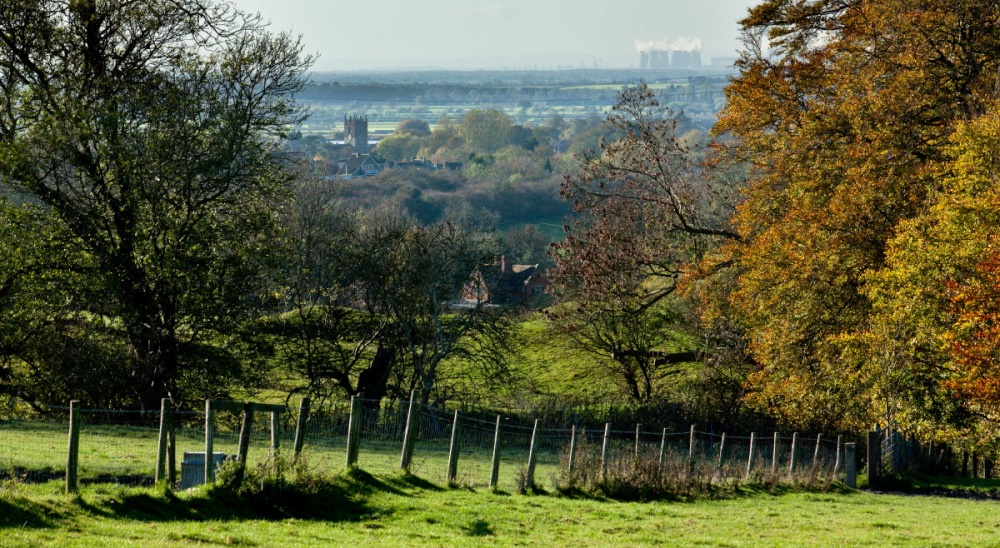
Coifi
Chief priest at the temple of Goodmanham; here Bede infers that there was some sort of organized and hierarchical pagan priesthood among Britons (hence, Coifi recorded as "cheif").
passing from winter into winter again
This is a lovely metaphor for life - like a sparrow passing (only momentarily) into a sheltered warmth between winters.
who he was, and whence he came
I like the way this is phrased - feels like a personal accounting; something any reader could identify with.
Now if the gods were good for any thing, they would rather forward me
This is interesting logic...
man of God came
Referring to Paulinus
The stranger coming close up, saluted him, and asked why he sat there in solitude on a stone
This event is depicted here in John Speed's Saxon Heptarchy from 1611:
nguish of mind, consumed with inward fire,
I find this to be a very poetic way to describe heartache and betrayal.
Ambrosius Aurelianus
Bede's information comes from Gildas; no earlier or more reliable sources is known for Ambrosius Aurelius, who later becomes the uncle of King Arthur in Monmouth's account. The battle of Mount Badon, if it occured at all, probably took place around 500 CE.
settlements
I.e, in Britain, not Germany
descent
Bede is apparently not troubled by the fact that Woden is a Germanic god, suggesting that by his day active worship of Woden was not widespread. In medieval historical writing, the various classical and Germanic gods (when they are not written off as demons masquerading to lead men astray) are usually explained as ancient heroes whose exploits and stature were inflated over time until they were worshipped as gods.
axons, Angles, and Jutes
Here is a handy map:

When the news of their success and of the fertility of the country, and the cowardice of the Britons,
This is very much the origin myth of how the Anglo-Saxon culture came to be...the term "invasion" is used to describe what happened when bands of Germanic tribes (largely from northern Jutland) began arriving on the British Isles though it was likely more sporadic than the term implies. You can read more about it here.
famine
Famines ravaged much of western Europe following the fall of the Western Roman Empire; between 400-800 AD, the population of Rome fell by over 90% largely due to famine and plague.
449-495
Note that the Anglo-Saxon Chronicle actually covers events from the beginning of the millenium (detailing biblical events of Christ's life and early Church history). You can read the entire text here.
see
Cities in which bishops or archbishops reside and have authority.
1087.
What strikes me about this date is that we missed 1066...I sort of like that the selections are of the lesser known years but keep anticipating some entries that are in keeping with the big events....
fain
"pleased or willing under the circumstances."
…

plundered
We're still talking about the Vikings here...they just wouldn't quit...
pirate-army,
Sometimes also translated as a "raiding ship army"
dispersed the others.
Alfred is really trying his best here to repel the Vikings (or "army" as it's recorded here)...by land and by sea...
Then Alfred, his brother, the son of Ethelwulf, took to the kingdom of Wessex.
King Alfred is one of the most celebrated kings in English history - he is credited as the only man who withstood Viking invasions and with creating the very idea of an "English nation" as the first king of the Anglo-Saxons. For this reason he is one of only two kings who is referred to as "the great".
but the Danes became masters of the field;
another defeat for Ethered and Alfred....
and there the Danes had the victory.
At Basing, the Danes won....
Danes were overcome
The Danes are defeated by Ethered and Alfred (what follows are a list of the prominent men who were killed.
army
Note that "the army" (Old English: "here") almost always means the Vikings.
They replied,
Note that we have shifted from indirect to direct discourse (dialogue is now being relayed word for word) - it may reveal the story's origins in the oral tradition.
town
Not the best translation - should better be "enclosure" by which they mean a small building surrounded by a wall (called a byrig); the king's fight took place inside the enclosure; the king's ride up to the outside and fight there.
alderman
A high-ranking nobleman.
Cerdic
Cerdic was a legendary leader of the West Saxons (and ancestor of Alfred the Great).
fled from the English like fire.
I quite like this use of simile to create a striking image (it seems a stylistic departure from what comes before).
Woden.
Woden = another name for the Norse God Odin. Here, his descendants are connected to the founders of England.
From this Woden arose all our royal kindred, and that of the Southumbrians also.
Most Anglo-Saxon royal genealogies trace the king's family back to a god, presumably as a way of emphasizing the king's status and power; later genealogy of the West Saxon kings will incorporate Biblical figures as well.
Angles
Different translation: "to Angelin" referring to the narrow land between modern Germany and Denmark, known today as Schleswig.
Ipwinesfleet
Modern day Ebbsfleet in Kent.
Hengest and Horsa
Both names mean "horse" in Old English and are probably not their given names.
This year
Often "this year" is also translated as "here" which points to structure of this document as a series of annotations.
This year
This story of the arrival of the Angles and Saxons is mostly taken from Bede's Ecclesiastical History with a few added details from popular legend and local tradition.
Kroger and K-Mart and Long John Silver’s.
This is an interesting commentary on corporatism - these large companies don't get asked "where are you from?" when they enter communities or cities unannounced....
Ancestor
I chose ancestor for you all to read (as it better fit our theme) but my favorite Jimmy Santiago Baca poem is this one.
dirges and their ditties
This is an example of alliteration (Walker uses this at other points as well) - "dirges" and "ditties" both begin with the syllable/sound "di" to create a rhythm and melody.
For my People
Watch the poem performed here:
rain and you’ll be up to your knees in disappointment
Beautiful metaphor - here dissapointment is being compared to rain ("you'll be up to your knees") in...great image.
your hands will always be too small
Note how she comes back to the image of hands that she used in the first paragraph.
Point B
This is a slam poem - watch Sarah Kay perform it here:
leaf smoke
How do you interpret this line? What do you picture for "leaf smoke"?
But it would grow restless there.
When she says "it" - what does she mean?
In Spanish it means too many letters.
I like this line because... all names mean something.
auger
What does this word mean?
sift of lost faces

George Ella Lyon
Watch George Ella Lyon recite this piece (and a bit more) here:
Interstate 40
If you had to claim a specific road, highway or street to be "from" - what would it be and why?
where are you from
How do you answer this question?
Limbo
We use this term "limbo" to indicate when something is no finalized, or yet to be determined; it actually comes from Catholic doctrine and was the place (between heaven and hell) where some souls ended up. I find it interesting that Kingsolver chose to capitalize the term here (so she is likely referring to this specific place).
ancestor.
Who is your "first" ancestor? Who do you imagine him/her to be?
Let it breathe
How do you interpret this? What is "it" here? What need to breathe?
Pat Mora
You can see Pat Mora discuss her childhood and experiences as a bilingual woman and author here:
to baptize myself under a new name
Have you ever wanted to change your name?
as if the syllables were made out of tin and hurt the roof of your mouth.
This is an example of simile (when a comparison is made; i.e. - saying someone's name to the feeling of tin scraping the "roof of your mouth") - what does your name feel like?
but don’t want to inherit her place by the window.
What do you think this line means?
My Name
You can see this performed by the Steppenwolf youth theatre company here:
Sandra Cisneros

Cisneros is one of the most celebrated Latina authors in the U.S. You can read more about her here.
Chicago.
If you had to characterize Austin in this way...what would be typical.... activities? foods? clothing? landmarks? note how Samantha Irby lists the above about Chicago in this section
affiance
trust
a-go
gone by
writing
ledger
advisement
preparation
weenest
suppose
Hie
Hasten
tide
time
prove
test
lightly
quickly
abiding
Here, Everyman says he will be ready to account in 12 years (he's pleading for a delay).
set not by
"I care not for"
no man dreadeth
That fears nobody
thou shalt make none attournay
i.e., "none can appear in your place"
we were in that way
i.e., "let's get started at once"
count
accounts
blind
unexpected
crave
request
wete
also sometimes spelled "weet" = "know"
depart
separate
cumbered
encumbered
to
for
deject
abased
and
if
appaireth
degenerate
covetise
avarice
two
reference to the two thieves between whom Christ was crucified.
Here is a depiction from around the time this play was written (end of the 15th century). 
ghostly
remember that "ghostly" would today be translated as "spiritual"...
unkind
thoughtless
all day
always
figure
in the form of
audience
i.e. hearing ("lend your ears")
Wife
The relationship between God and humanity is also conceived as a mystical marriage in which Christ is the bridegroom and the human soul his spouse.
behoved
i.e., "it was fitting"
f sin had not been,
Julian here is posing an age-old question, if God is omnipotent, why did he allow sin to exist in the first place? What do you think of this question? And what do you think of Julian's response?
letted
hindered
meed
Reward
quick
vivid
made
Emptied of (its attachment to) all created things.
unmade
i.e. we need to know that we should not be attracted to earthly things, which are made, but to love and possess God, who is not made, who exists eternally.
Substantially oned
Joined to him in "substance," which Julian regards as the eternal essence of being.
waxen above a child
Grown a little older than a child.
of
by
Benedicite Domine
Blessed be the Lord
as to my sight.
i.e. as I see it, as I understand it
Shewing
"showing"
mean.
intermediary
wist
knew
Curate
member of the clergy - often a priest, vicar or rector
as to my feeling
as it felt to me
dured
endured
so short in regard of
in comparison with
passed;
died
weened
"weened" = "supposed"
Thus I awoke,
The dreamer is now narrating; this section is the only indication we have (potentially) of the writer's life. It seems from details here that the Dreamer was someone with clerical training who has received consecration into minor clerical orders (such as that of a deacon).
loller
Idler, vagabond. The term was eventually applied to the followers of John Wycliff and his proto-Protestant belief system.
Cornhill,
An area of London then associated with vagabonds, seedy clerics, and people at loose ends.
.
That they have done good shall go into life everlasting; and they that have done evil into everlasting fire (from the Athanasian Creed)
a poena et a culpa
This pardon has remained one of the most controversial elements of this poem. "From punishment and from guilt" is a formula indicating an absolute pardon. Strictly speaking, remissions obtained by pilgrimages (and pardons dispensed by pardoners in return for donations) could remit only the punishment for sin; note that even Truth's pardon does both only for some people .Christ alone, through the Atonement, had the power to absolve repentant sinners from the guilt and delegated it to St. Peter and to the Church through the apostolic succession to be dispensed in the sacrament of confession and in penance. The belief, however, that indulgences (especially those obtained from the pope himself) absolves both guild and punishment was widespread.
.
Vengeance is mine and I will repay.
pease
"peaseloaf" = a cheap and coarse grade of bread, the food of those who could not afford better.